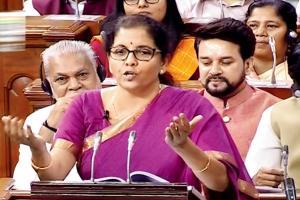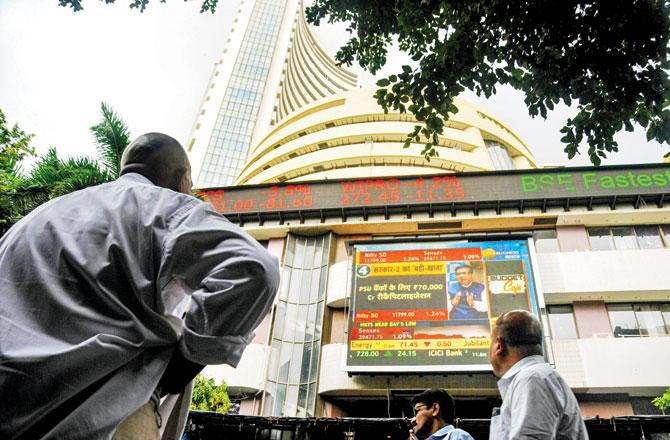Analysis: Tax-ing times for the super rich, a middle-class roped in as a collaborator and the Donald Trump effect

(Top) Finance Minister Nirmala Sitharaman presenting Budget 2019 in Parliament on Friday
 The 'Electric Bullet Train Budget' stopped at station India yesterday. The term is derived from the electric engine that will drive the economy through the next year. Finance Minister Nirmala Sitharaman's budget, with the thrust on electric cars and reduction of customs duties and GST, is the future.
The 'Electric Bullet Train Budget' stopped at station India yesterday. The term is derived from the electric engine that will drive the economy through the next year. Finance Minister Nirmala Sitharaman's budget, with the thrust on electric cars and reduction of customs duties and GST, is the future.
ADVERTISEMENT
As the World Cup moves towards edge-of-the-seat final stages, it is time to look at this budget through the cricketing lens. The surcharge is the short ball, surprising the super rich. It targets those earning above R5 crore per annum and those between R2 crore and R5 crore per annum. It may mislead because the additional surcharge is 25 per cent for income of individuals between 2 and 5 crore and 37 per cent for those above 5 crore. The announcement also raised apprehensions about the hopes of others who had income between 50 lakh and 2 crore, into thinking that the FM would have some waiver for them, too, but it was not to be.
Taxing Eloquent
The Tax Deducted at Source (TDS) for withdrawals in excess of R1 crore per annum from a bank account raises questions like, will this be creditable against business income of the one withdrawing it? Will this be for all bank accounts of the assessee or is this the limit for each bank account of the assessee? While those seem gray areas right now, what is clear is that this is dependable revenue for tax authorities.

After touching the 40,000-mark in morning trade, the BSE Sensex turned choppy after Finance Minster Nirmala Sitharaman presented her maiden Budget on Friday. Pic/PTI
Start-up Sizzler
The extension of incentive on investments in start-ups arising from sale of residential house should boost entrepreneurial instinct. Youth want to sell their non-earning ancestral houses and redeploy the money into more active earnings. Such deductions will induce more youth to undertake active deployments and re- channelise investments from residential houses towards more productive deployment and start ups. We may just see a dip in preference of a residential home as an asset.
Trump effect
Donald Trump threw a long shadow over the budget. Corporates with a R400 crore sales turnover have a 25 per cent tax on them, unlike the earlier R250 crore sales turnover. That's called the 'Trump approach' of reducing corporate taxes.
Just like a scoreboard may not be entirely indicative of the nature of a match, a budget cannot be judged only by figures. I discern a clear swaying of sentiment which has been building up for the past three years. See the arc of evolution of taxpayers, the mood has changed from distrust or non-co-operation to one of compliant taxpayer. The taxpayer is now not looked on as 'adversary' but as 'partner' or 'contributor' to a mutual national effort. In this way, the taxpayer also believes that his taxes are going towards development. The budget seems to be the flourish on the signature of this change. Further gifts include GST returns to be filed by entities having annual turnover of less than R5 crore quarterly instead of monthly.
Aadhaar and PAN
Provisions about faceless tax assessments for scrutiny cases, pre-filled tax returns to be provided to taxpayers, interchangeability of Aadhaar and PAN are futuristic.
Mujhko bhi gift kara de, thoda sa toh gift kara de, seems askew now as gifts given by resident Indians to non-residents were before this budget not subjected to TDSA. Now that changes. The government has bowled a yorker, and such gifts to non-relatives will be subjected to tax deductions in India.
It is baffling to see that payments made to contractors or professionals by individuals for payment in excess of R50 lakh will now need TDS. Yet, one does have a cash withdrawal tax as well as a cash transactions upper limit of R2 lakh?
Question marks are hanging in the air, though on certain aspects like when purchasing any immovable property, one will now have to deduct tax (TDS) not only on the purchase price but also advance fees for electricity, water, parking, club membership, etc. This makes a very complete TDS at the time of asset purchase.
Yet, the problem is often, all charges are not estimated or known in advance. With the Annual Information Return reflecting these as sale consideration will they be considered as such for computing capital gains?
Black money
In the end, the Retrospective Amendment to Black Money Act 2015 (BMIT) is redefining Assessee to include Non-Residents and RNORs, too. The Black Money Act, 2015 defined the assessee to include a person who is a resident in India within the meaning of Section 6 of Income tax Act, 1961. As per the proposed amendments, section 2 of BMIT Act as redefined the "assessee" to include Non- Resident or Resident but Not Ordinary Resident in context of the undisclosed income earned or undisclosed asset acquired, outside India during the period when such assessee was otherwise a resident in India and liable for disclosure. Further, will the BMIT Act authorise for re-verification of the residential status of the assessee or will it have to rely upon the status as already established in regular tax assessments or returns filed? Will the powers under BMIT Act provide re-verification of the residential status as Non-Resident or Resident but Not Ordinary Resident either under its provisions or by providing Directions to the Assessing Officer for re-assessment?
Some say this budget throws up more questions than answers. I say there are some slips but some clever catches. And, in these days of the World Cup we know that catches win matches.
Mitil Chokshi is a Chartered Accountant and Senior Partner, Chokshi and Chokshi, LLP Mumbai.
Catch up on all the latest Crime, National, International and Hatke news here. Also download the new mid-day Android and iOS apps to get latest updates
 Subscribe today by clicking the link and stay updated with the latest news!" Click here!
Subscribe today by clicking the link and stay updated with the latest news!" Click here!






